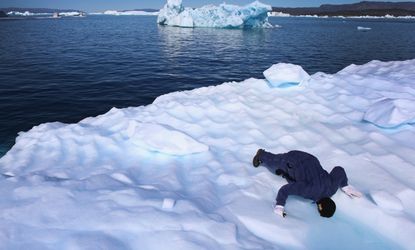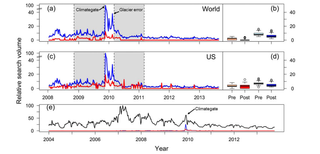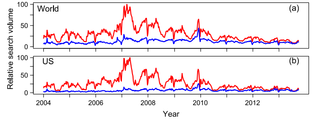What impact did 'Climategate' have on public opinion?
A new study examines the effect of a scandal that had made the reality-based community nervous


In November 2009, someone hacked into servers at the Climatic Research Unit of the University of East Anglia, stole thousands of emails, and spread them over the internet. Climate change deniers pored over the text, found the most inflammatory-sounding bits, ripped them out of context, and whipped up a media firestorm around what they dubbed "Climategate," which purportedly revealed a vast conspiracy to fool people into believing in climate change.
Then, a few months later, an error was discovered in the U.N. Intergovernmental Panel on Climate Change's Working Group 4 report: An unsupported paragraph that predicted that the Himalayan glaciers could melt by 2035.
Eight subsequent investigations found no evidence of wrongdoing or scientific malfeasance related to the email hack. The IPCC error was relatively minor and eventually corrected. But these events led to a lot of anxiety in the climate science community, which feared its reputation had been seriously damaged.
Subscribe to The Week
Escape your echo chamber. Get the facts behind the news, plus analysis from multiple perspectives.

Sign up for The Week's Free Newsletters
From our morning news briefing to a weekly Good News Newsletter, get the best of The Week delivered directly to your inbox.
From our morning news briefing to a weekly Good News Newsletter, get the best of The Week delivered directly to your inbox.
That led William Anderegg and Gregory Goldsmith, scientists at Princeton and Oxford, respectively, to conduct a study for Environmental Research Letters that looked at Google Trends data to gauge how this "scandal" affected public opinion.
The result? You can relax a little, science. The study, released today, is good reason to believe that these events were forgotten very quickly, and have had little long-term impact on the state of public interest in climate change denial. But worryingly, interest in climate change itself has also declined.
Now, there are some limitations to their approach, and it’s no replacement for polling. But it’s also open-source, and fairly cheap. Overall, "it’s considered a good metric of public interest," says Anderegg.
So what does the paper show? First, both the Climategate event and the glacier error were mere flashes in the pan. They had no long-term effect on the state of public interest in "climate change" or in "climate change hoax." In fact, the interest in "climate change hoax" has actually declined relative to where it was the year before the whole Climategate nonsense:

Box (a) shows, for the whole world, the relative search volume of "global warming hoax" (blue line), and what percentage those searches are of the search for "global warming" (red line). Box (c) shows the same as (a) but only for the United States. Box (e) shows "climategate" (red) and "global warming hoax" (blue) compared to "climate change" (black). Basically, Climategate and the glacier error were brief spikes, both swamped by the long-term declining trend.
Second, there has been a secular decline in interest in climate change itself over time. From a peak in 2007, when Al Gore's An Inconvenient Truth was still generating a lot of buzz, public interest in climate change has fallen dramatically. Here we see "global warming" in red and "climate change" in blue:

Why could this be? Three possible reasons: First, the financial crisis and subsequent mass unemployment disaster became the top concerns of voters, sweeping climate change out of the media's eye.
Second, hyperpartisanship in the Obama era, which has seen the GOP oppose anything Obama is for. John McCain had a climate bill as part of his 2008 platform, but now full-blown climate denial is a litmus test to being elected as a Republican in most places. As a result, climate change has moved from being perceived as a universal crisis to just another area of partisan squabbling.
Third, fatigue. Even those who are concerned about climate change can't maintain interest when the basic facts of the phenomenon have been known for years.
There are some lessons scientists might draw from this. It turns out that Climategate "wasn’t the death knell of credibility" for climate science, says Anderegg. Indeed, singular events of just about any kind are quickly forgotten — notice that Hurricane Sandy, which was heavily covered as a climate-change-driven event, is little more than a blip in the second chart. "A lot of public interest is pretty transient around individual events," he says.
Instead, the focus for climate activists, allied journalists, and scientists ought to be on building the kind of momentum that can create a mass movement and support a steady drumbeat of coverage, interest, and political pressure.
Sign up for Today's Best Articles in your inbox
A free daily email with the biggest news stories of the day – and the best features from TheWeek.com
Ryan Cooper is a national correspondent at TheWeek.com. His work has appeared in the Washington Monthly, The New Republic, and the Washington Post.
-
 Sudan's forgotten pyramids
Sudan's forgotten pyramidsUnder the Radar Brutal civil war and widespread looting threatens African nation's ancient heritage
By Harriet Marsden, The Week UK Published
-
 'Being more nuanced will not be easy for public health agencies'
'Being more nuanced will not be easy for public health agencies'Instant Opinion Opinion, comment and editorials of the day
By Justin Klawans, The Week US Published
-
 Where did Democratic voters go?
Where did Democratic voters go?Voter turnout dropped sharply for Democrats in 2024
By Joel Mathis, The Week US Published